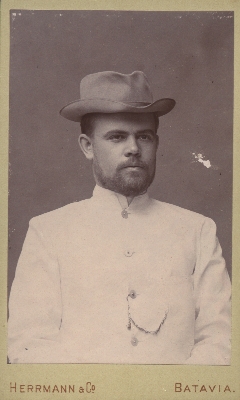
Hans Fruhstorfer was a German explorer, insect and shell trader and entomologist who specialised in Lepidoptera. He collected and described new species of exotic butterflies, especially in Adalbert Seitz's Macrolepidoptera of the World. He is best known for his work on the butterflies of Java.

Meghimatium fruhstorferi is a species of medium to large air-breathing land slug, a terrestrial pulmonate gastropod mollusc in the family Philomycidae and the superfamily Arionacea, the roundback slugs.
Hylaeothemis fruhstorferi is a species of dragonfly in the family Libellulidae. It is endemic to Sri Lanka. Its natural habitats are subtropical or tropical moist lowland forests and rivers. It is threatened by habitat loss.

Macroglossum fruhstorferi is a moth of the family Sphingidae. It is known from the Obi Islands and Java.

Rhodopina is a genus of longhorn beetles of the subfamily Lamiinae, containing the following species:

Rhodopina formosana is a species of beetle in the family Cerambycidae. It was described by Stephan von Breuning in 1954.
Rhodopina nilghirica is a species of beetle in the family Cerambycidae. It was described by Stephan von Breuning in 1939.
Rhodopina similis is a species of beetle in the family Cerambycidae. It was described by Stephan von Breuning in 1940.
Rhodopina tubericollis is a species of beetle in the family Cerambycidae. It was described by Stephan von Breuning in 1943. It is known from Borneo.
Rhodopina laevepunctata is a species of beetle in the family Cerambycidae. It was described by Stephan von Breuning in 1958.
Rhodopina parassamensis is a species of beetle in the family Cerambycidae. It was described by Stephan von Breuning in 1975.
Rhodopina alboplagiata is a species of beetle in the family Cerambycidae. It was described by Charles Joseph Gahan in 1890. It is known from India.
Rhodopina lewisii is a species of beetle in the family Cerambycidae. It was described by Henry Walter Bates in 1873.
Rhodopina nasui is a species of beetle in the family Cerambycidae. It was described by Komiya and Kusama in 1974.
Rhodopina okinoerabuana is a species of beetle in the family Cerambycidae. It was described by Masao Hayashi in 1966. It is known from Japan.
Rhodopina piperita is a species of beetle in the family Cerambycidae. It was described by Charles Joseph Gahan in 1890.
Rhodopina tokarensis is a species of beetle in the family Cerambycidae. It was described by Masao Hayashi in 1956.

Delias fruhstorferi is a butterfly in the family Pieridae. It was described by Eduard Honrath in 1892. It is found in the Indomalayan realm, where it has only been recorded from Java.
The bluebelly Java snake, also known commonly as Fruhstorfer's mountain snake and the Javan bluebelly snake, is a species of snake in the family Colubridae. The species, which is the only member of the genus Tetralepis, is endemic to Java.

Acanthacorydalis fruhstorferi is a species of dobsonfly native to Vietnam and China. It holds the title of largest aquatic insect by wingspan according to the Guinness Book of World Records at 21.6 cm. The title formerly belonged to the Brazilian damselfly Microstigma rotundatum.





